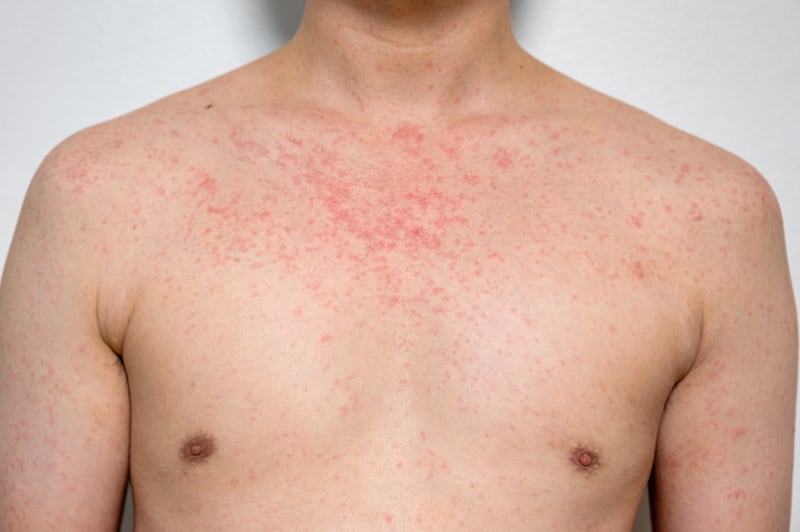Medical experts are urging parents to ensure children are vaccinated against measles.
Here’s what you need to know about the highly infectious viral illness.
What causes measles and how does it spread?
According to the NHS, the virus is spread via small droplets from the nose and mouth when an infected person coughs or sneezes, which are then breathed in by someone else. However, you can also contract measles if you touch a surface that these droplets have settled on, and then put your hands near your mouth or nose.
Measles rash and other signs and symptoms
According to the World Health Organisation (WHO), measles is a serious airborne infection. While often associated with a rash, there’s more to it than this and the virus can spread around the body, potentially leading to severe complications and in some cases death.
It usually takes around seven to 14 days for the first symptoms to appear. You will typically suffer from a high temperature, as well as a cough, runny or blocked nose, and red, watery eyes.
The measles rash usually appears a few days after these symptoms. There may be small white spots inside the cheeks and lips, as well as a raised red rash that can start on the face and spread throughout the body.
Measles is a highly infectious viral illness. Measles starts with cold-like symptoms that develop about 10 days after you get infected. You will then get a measles rash a few days later. The illness usually lasts 7 to 10 days.
— HSE Ireland (@HSELive) February 2, 2024
For more information on symptoms, how to treat… pic.twitter.com/Apm2Xjeenc
Can adults, children and babies catch measles?
Measles is highly contagious, meaning it can spread easily and anyone, child or adult, can catch it.
How do you prevent measles?
The MMR (measles, mumps and rubella) vaccine, usually given in two doses during early and later childhood, is key for preventing measles. Between 2000 and 2021, measles vaccinations stopped 56 million deaths worldwide, according to the WHO. Those who did not receive the vaccine in childhood may still be able to get it as an adults – check with your GP if unsure.
In addition, avoiding close contact with somebody who is infected, regular hand-washing and covering your mouth and nose when coughing and sneezing all helps.

How serious is measles?
There’s often been a misconception that measles is just a rash or fever that clears up in a few days. But measles can be very serious, especially for babies and children under the age of five. Unfortunately, as the NHS points out, there is no real way for parents to prepare for how severe symptoms may be for their child. Complications can include brain swelling, seizures, pneumonia and serious breathing difficulties.
Is measles harmful during pregnancy?
Measles can also be very harmful during pregnancy. If you have been in contact with someone who has measles and you are pregnant, contact your GP or maternity hospital.
How do you treat measles?
As measles is a viral infection, antibiotics won’t help. However, symptoms usually subside between seven to 10 days.
While there is no specific treatment, doctors advise resting and getting plenty of water to stay hydrated. Paracetamol and Ibuprofen can help with a temperate and fever, and cotton-wool soaked in warm water can be used to gently remove any crusts from around the eyes.
If symptoms don’t improve or are getting worse, seek medical advice. If there is any sign of breathlessness, reduced consciousness or a very high temperature that doesn’t respond to medication, seek urgent help.
#MMRcatchup
— Public Health Agency (@publichealthni) February 7, 2024
Any children or young people aged 12 months to 25 years who missed getting the vaccine first time around will have the opportunity to receive it now.https://t.co/d18j9K5qfu pic.twitter.com/30RKzkXUDL
Is there a measles vaccine?
Yes there is a measles vaccine. The MMR (measles, mumps and rubella) vaccine, usually given in two doses during early and later childhood, is key for preventing measles.
In Northern Ireland anyone between the ages of 12 months and 25 years who are unvaccinated can receive their vaccine now at ‘catch-up clinics’. Children aged between one and five can receive their vaccination via their GP and those aged six to 25 can get a vaccine at an MMR clinic by making an appointment or turning up. For more information click here
The latest figures from the Public Health Agency (PHA) show that in Northern Ireland, 88.8% of the population had received their first dose of MMR at two years of age, with 85.4% receiving their second dose of MMR when reported at five years of age.
This still means that Northern Ireland falls below the World Health Organization (WHO) recommendation that at least 95% of children should be fully vaccinated for diseases to prevent further outbreaks.
In the Republic of Ireland Chief medical officer Breda Smyth said she is concerned that the country is at high risk of an outbreak because the vaccination rate is at 89.2% in the Republic, and in some areas has fallen below 80%. For more information click here









